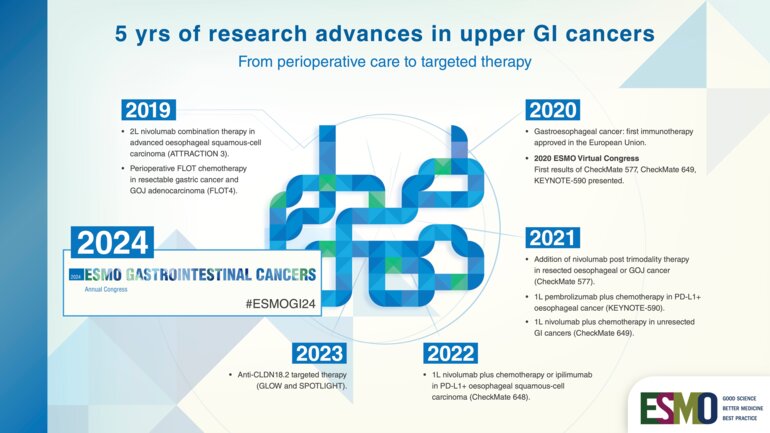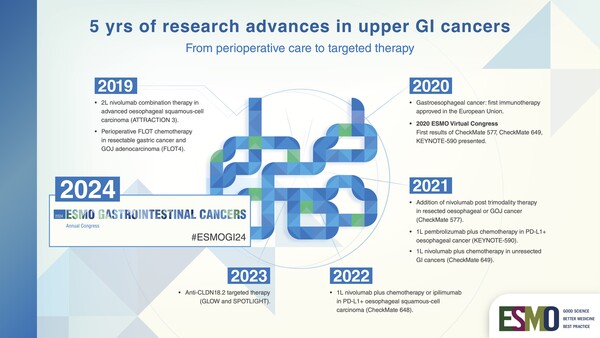In the last few years, study findings have changed clinical practice and offered new opportunities of care to many patients
After a period when the management of gastrointestinal (GI) malignancies was lagging behind other tumour types, more recent research advances have opened-up new opportunities of care for many patients with gastric, gastroesophageal and pancreatic cancers. For medical oncologists working in the GI area, these are very exciting times, and more is expected to come from ongoing studies investigating novel treatment approaches. Capturing the thrill, ESMO has reinforced its commitment in the field by launching a new peer-reviewed journal in 2023, ESMO Gastrointestinal Oncology, whose Co-Editor-in-Chief is Prof. Florian Lordick, University of Leipzig, Germany.
To what extent does the launch of the ESMO Gastrointestinal Oncology journal reflect today’s great excitement around gastrointestinal oncology and the need for further research in the field?
In the last few years, we have seen many advances in gastrointestinal oncology which were eagerly awaited. Key studies have recently proven the efficacy of some targeted agents and immunotherapy also in GI oncology, and more treatment options are today available for our patients at any stage of their disease. This fast-evolving landscape is reflected in the new ESMO journal where attention is given not only to novel treatment approaches, but also to data on the molecular characteristics of GI cancers and their classification, translational research and precision oncology. Although knowledge in the field is growing, there is still a big clinical need for a better prognosis. In fact, too many people are first diagnosed with already advanced disease stages and many patients experience recurrence, so there is an enormous need to progress further in GI cancers care, but also in prevention: for instance, we are now witnessing a rapid increase of early-onset cancers among the young population, mostly pancreatic cancer and gastric cancer (JAMA Netw Open. 2023;6(8):e2328171), so research in risk factors and hereditary cancer is getting more and more important too.
There is a lot going on in GI oncology from a scientific perspective, but some improvements have also been made in the implementation of large multidisciplinary networks. A multidisciplinary approach is important for many tumour types, but this becomes crucial for GI cancers, which cannot be treated by medical oncologists alone.
Immunotherapy research in gastric cancers has progressed at unprecedented speed in the last few years. What have been the major milestones in the field for the treatment of these malignancies?
After more than a decade with no major positive study in the treatment of advanced gastric cancer, from 2021 until now we have seen several studies that consistently show the positive role of immunotherapy in this setting. Nivolumab is now a new treatment option even for the adjuvant treatment of completely resected esophageal or gastroesophageal junction cancer in patients who had residual pathologic disease following chemoradiotherapy and surgery, based on the findings of the CheckMate 577 (N Engl J Med. 2021 Apr 1;384(13):1191-1203). Also, the PD-1 inhibitor showed an overall survival benefit in previously untreated patients with advanced gastric, gastro-oesophageal junction, or oesophageal adenocarcinoma when combined with chemotherapy as reported in the CheckMate 649 (Lancet. 2021 Jul 3;398(10294):27-40) and in patients with advanced esophageal squamous-cell carcinoma when combined with chemotherapy or ipilimumab according to the findings from the CheckMate 648 (N Engl J Med. 2022 Feb 3;386(5):449-462). Positive results were also shown with pembrolizumab in the first-line setting for advanced oesophageal cancer as reported in the KEYNOTE-590 (Lancet. 2021 Aug 28;398(10302):759-771) and, more recently, with other checkpoint inhibitors such as tislelizumab for advanced or metastatic oesophageal squamous cell carcinoma (Lancet Oncol. 2023 May;24(5):483-495) which is of particular interest for Asia-based research.
These key studies have shown that immune checkpoint inhibitors (ICIs) do not work for every patient, so treatment selection according to biomarkers is very important. One of the lessons learnt is that the higher the PD-L1 expression is, the better the outcomes are when adding immunotherapy to treatment.
An additional important step towards a better selection of patients is the recognition of microsatellite instability (MSI) in gastric and other gastrointestinal cancers as a strong predictive biomarker for ICIs treatment.
What have been the main advances in the treatment of gastrointestinal tumours beyond immunotherapy?
Another crucial area where important results have been achieved in the last years is targeted therapy directed against HER2, where some effective antibody-drug conjugates (ADCs) came into play recently. The anti-HER2 monoclonal antibody trastuzumab is a well-established first-line treatment for HER2-positive advanced gastric cancer in combination with chemotherapy (Lancet. 2010 Aug 28;376(9742):687-97), however the occurrence of resistance mechanisms has been observed in several trials, encouraging the search for novel strategies targeting tumours after progression. The antibody-drug conjugates trastuzumab deruxtecan has emerged as a very promising compound by demonstrating substantial clinical benefits in patients with HER2-positive gastric cancer (N Engl J Med. 2020 Jun 18;382(25):2419-2430) and unresectable/metastatic gastric/gastroesophageal junction (G/GEJ) cancer (Lancet Oncol. 2023 Jul;24(7):744-756). There is a lot going on now in the field, not only with ADCs, but also with site specific antibodies, CAR-T cells and the completely new target Claudin-18 isoform 2 (CLDN18.2), a tight junction protein exclusively expressed in normal gastric mucosa cells and that is retained in most G/GEJ adenocarcinomas. In the GLOW and SPOTLIGHT studies, investigating the clinical benefit of targeting CLDN18.2 in the first line, the addition of the anti- CLDN18.2 antibody zolbetuximab to standard chemotherapy regimens significantly improved PFS and OS in patients with CLDN18.2-positive, HER2-negative, locally advanced unresectable or mG/GEJ adenocarcinoma (Nat Med. 2023 Aug;29(8):2133-2141; Lancet. 2023 May 20;401(10389):1655-1668).
What is the most difficult-to-treat cancer of the upper gastrointestinal tract today?
Pancreatic cancer still represents a challenge since progress in this setting has been slower than for other GI malignancies and the management of advanced disease relies on the use of chemotherapy. Nevertheless, some treatment improvements have been achieved in this setting with more effective triple chemotherapy FOLFIRINOX (irinotecan, oxaliplatin and 5-fluorouracil) (N Engl J Med. 2011 May 12;364(19):1817-25) and double chemotherapy with gemcitabine and nab-paclitaxel (GemNabPaclitaxel) (N Engl J Med. 2013 Oct 31;369(18):1691-703), which are now integrated into clinical practice in adjuvant and perioperative settings, offering a chance of cure to patients. A debate is now ongoing on assessing whether one regimen is superior to another following the results of a study presented in 2023 (Lancet. 2023 Oct 7;402(10409):1272-1281).
We really need to take a very closer look at pancreatic subgroups to understand for which we can do more than the classically established one-size-fits-all approach. Although it is true that classical targeted therapy is less effective in this setting, some promising findings have been reported in BRCA-mutated pancreatic cancers where we have now an effective maintenance therapy with PARP inhibitors (J Clin Oncol. 2022 Dec 1;40(34):3929-3939). Some other opportunities for personalised treatment have also emerged for those tumours that do not carry a KRAS mutation, or that carry NTRK fusions or have microsatellite instability. But in the next years I believe that major progress is likely to come from targeting the tumour microenvironment, which is particularly complex in pancreatic cancer.
ESMO Gastrointestinal Cancers Congress 2024
In recent years we have seen remarkable progress in the treatment options available for patients with GI cancers and ESMO is committed to ensuring that there is a clear roadmap to help facilitate the implementation of new practice changing discoveries in the clinic for the benefit of all patients with GI cancers and whose wellbeing is our primary concern. The ESMO Gastrointestinal Cancers Congress 2024 will take place from 26 to 29 June in Munich, Germany.









